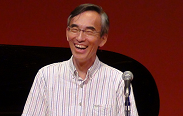This is to follow DTE(III) below.
4. Benefits of DTE
As far as the voters participate in discussions and elect their representatives in their own groups at the respective Small Meetings, they feel responsible and would take actions as necessary, through the established network via DTE.
If a leadership is supported in the society through all those concerned to the top decision-makers, the results will be promising, just like large successful companies e.g. GE and Toyota.
Additional positive impact by Bottom-up Approach combined with the conventional Top-Down leadership will be phenomenal in 10 to 15 years to come as DTE is repeated every election regional or national, owing to the learning effect of the voters, and decreased frustrations and misunderstandings thanks to the Small Meetings.
The benefits of DTE are summarized as follows.
1) The voters will have good understandings on issues and policies in a big picture through Small Meetings.
2) The voters can provide their own ideas, and raise issues and complaints to the elected face-to-face.
3) DTE requires voters to use time, limited expenses and most importantly wisdom for discussion, but frustrations will be much less than the conventional election system.
This effect reduces seeds of terrorism.
4) Candidates need almost no money to participate in DTE, and the election process will have good transparency, because candidates need neither self-promotion, nor preparatory movement for the election.
Small Meetings are all recorded for open monitoring to critical eyes of the public.
5) Ballot counting is no longer necessary, because candidates are elected at the Small Meetings only.
6) Restaurants and conference rooms will be occupied for Small Meetings, with positive impacts to the regional economies.
7) Bottom-up effect from the citizens will increase economic impacts to the implemented policies.
8) Public servants would improve their services due to direct contacts with the citizens through discussion at Small Meetings.
9) Wisdom will be transferred from the experienced elderly to the inexperienced youths, and exchanged among voters with different backgrounds and business sectors.
10) Local communities will be formed through Small Meetings.
11) The number of candidates will increase drastically because of reasonable process e.g. face-to-face discussion in DTE to reduce bias out of rumors, which would reduce the risk in quality of leadership, whoever the finally elected would be.
(High competition, transparent steps and open discussion for election will ensure more qualified voters to be candidates.)
12) Psychological logics in election will be totally opposite. The voters will not elect from those who want to be politicians, but from those the voters want to be politicians/leaders.
13) High possibilities of electing those with excellent hands-on business and technical skills, rather than those good at self-promotion.
14) Human networks to be established through Small Meetings and practical Advisers would realize the overall optimization of politics and public administration.
15) Periodical evaluation by the Advisers group, every half a year, on the performance of the elected will maintain appropriate tension in the mindsets of the politicians.
16) The Advisers with hands-on experiences identified and networked by Small Meetings will support policy-makings and implementation.
Those elected will include tough-minded capable human resources with hands-on experiences in business and technological fields.
The elected ones include those who volunteer to keep office for up to a few terms to improve politics from their hands-on experience/perspectives.
For instance, regarding the operation of nuclear power plants, hundreds of politicians had been engaged in the preparation, implementation and continuing subsidies to the regions in Japan before 3.11 Fukushima Accident in 2011.
However, having looked at the causes for the accident, none of them seem to have hands-on experience in the fields of risk management, and engineering,
since the accidents in Fukushima could have been perfectly avoided, if some of the politicians have the knowledge of junior high school science and math, combined with hands-on experience in power generation and risk management.
If more politicians elected are those with practical hands-on experience, some in global business and small enterprise management, and the others in engineering, more problems will be easily solved with limited time/ budget.
If members of the House of Councilors (or one of two Houses) can be elected by DTE, synergy will emerge in relation to the House of Representatives in Japan.
If you are once elected by first tier of the Small Meeting by DTE, you are regarded as one in the selected 10%, and those elected twice means 1% of the total.
Those elected three times, you are one of 1000, which is 0.1% through discussions of the interested voters in DTE.
In Japan, the total competition to be politicians was only 1.2 that is 10 politicians out of 12 candidates in year 2010 which indicates a serious systematic problem in electing social leaders who must be, otherwise, proud of themselves.
Reality is very few voters believe politicians are proud professions due to the systematic problem.
Many of the current politicians are successors of family politicians, or those good at self-promotion with limited hands-on experiences, who cannot effectively deal with diplomacy and emergencies requiring engineering knowledge and experience, e.g. nuclear power accident.
It is considered that there will be a stark contrast in quality of leaderships between those elected by the conventional elections 10 out of 12 candidates, and those elected by DTE, one out of more than 1000 voters through deliberative discussions.
To continue;
